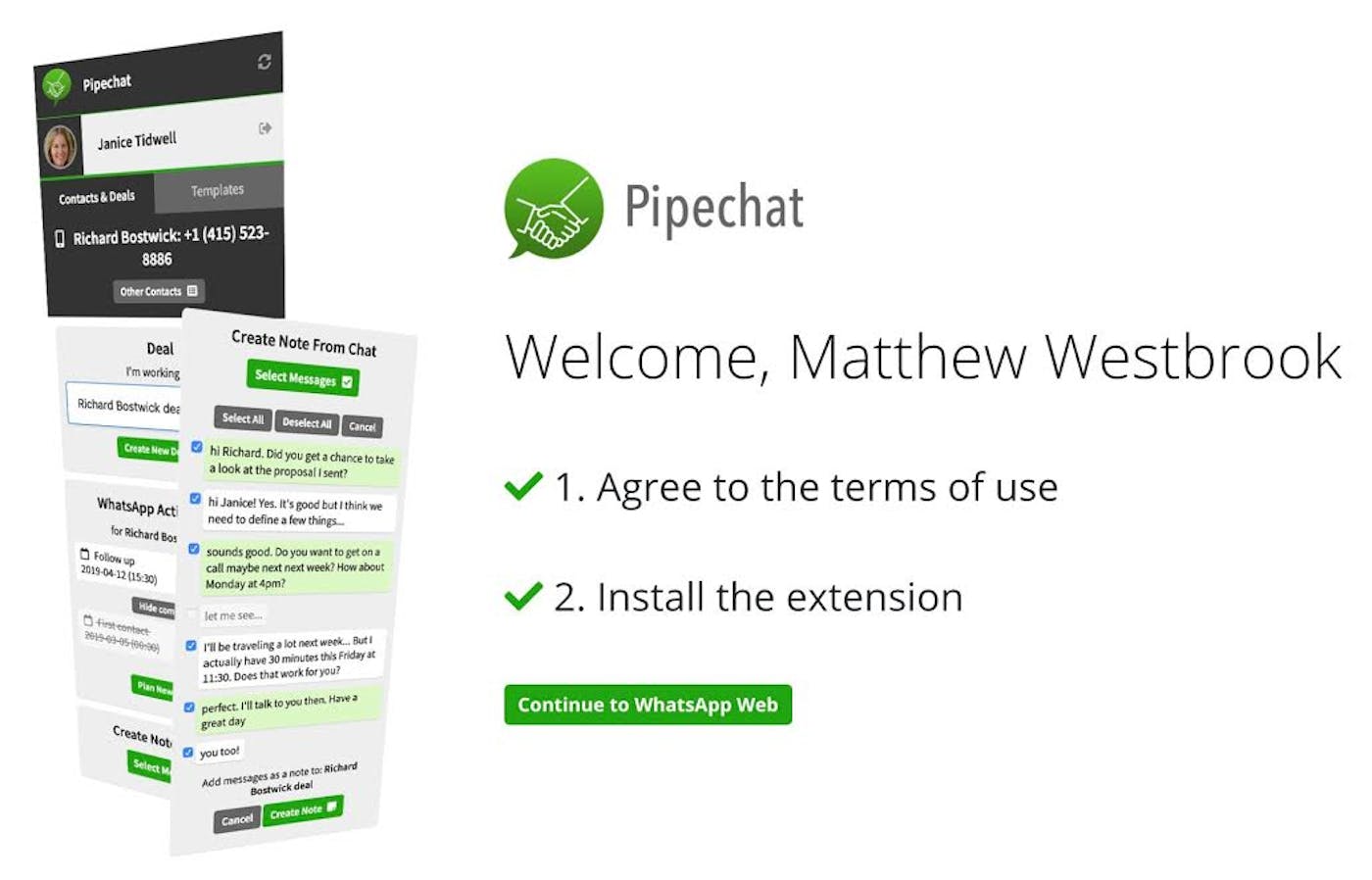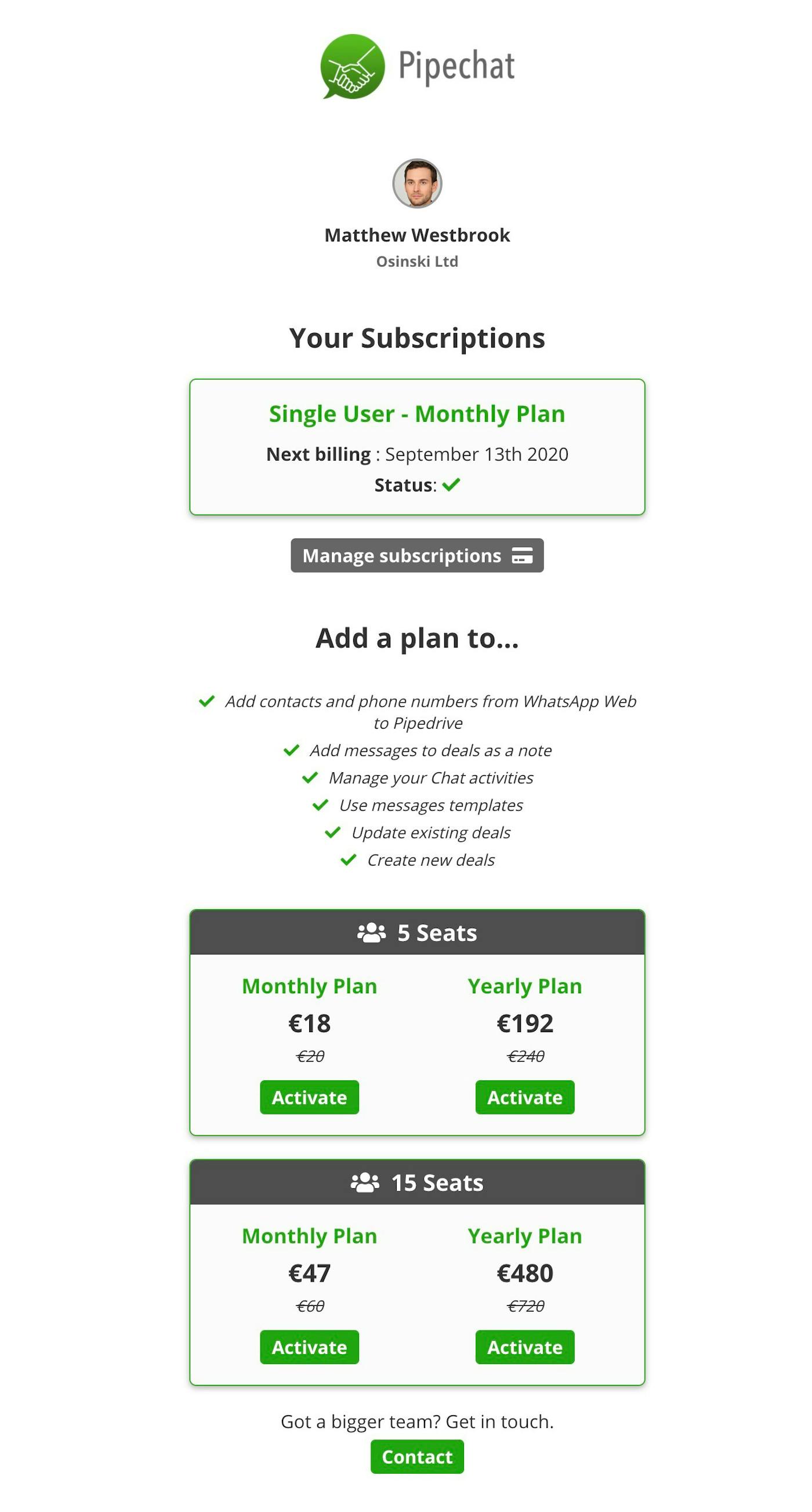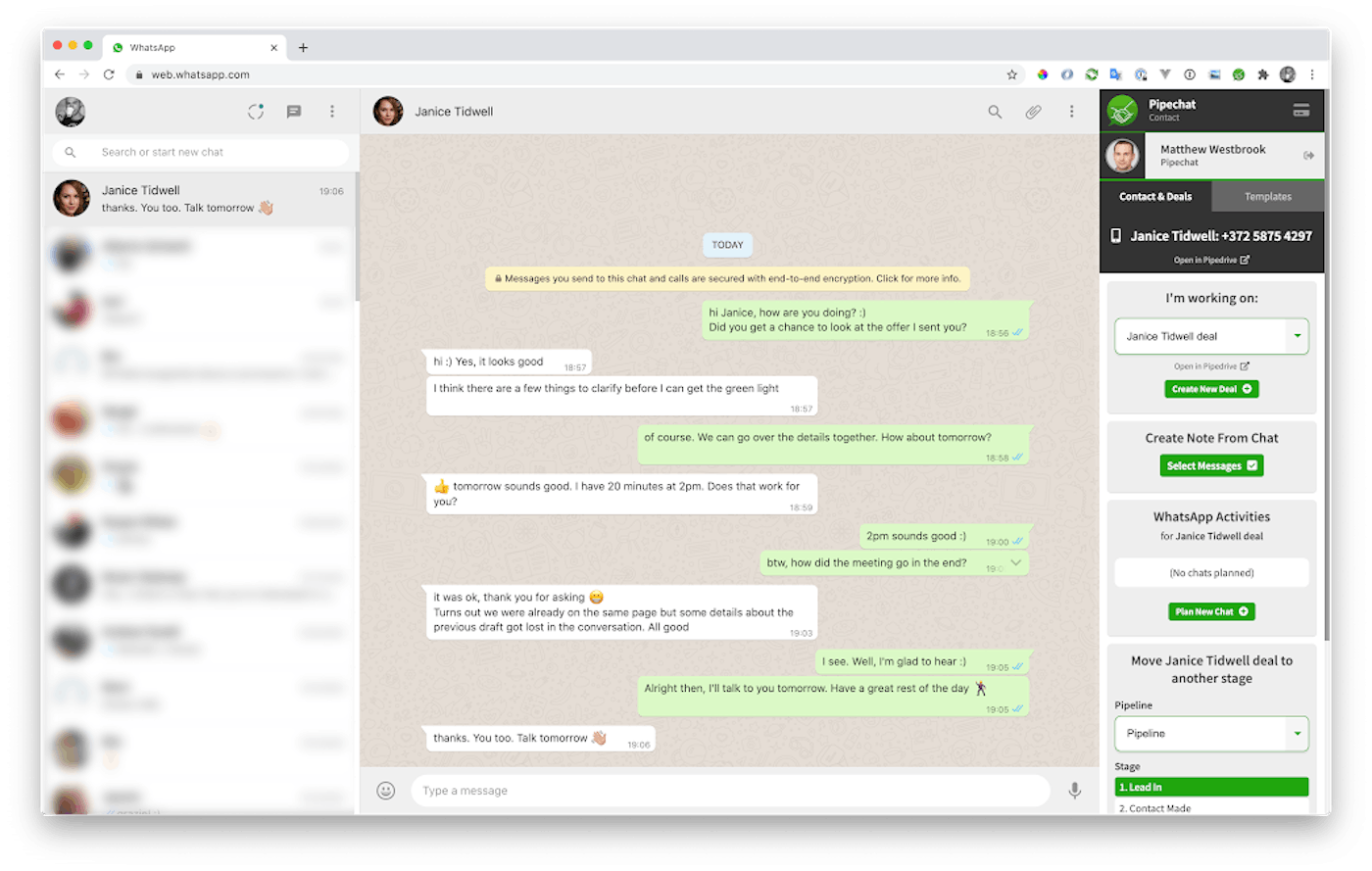Why I Created a Third Party App for My Day Job's
Product
Hello! What's your background, and what are you working on?
My name is Daniele, and I'm a software engineer. For the past two and a half years I've worked full time at Pipedrive, a sales CRM company. First I worked in developer relations and now as a product manager.
My own project is Pipechat, a simple app to connect Pipedrive to WhatsApp Web. It's still a side project, but it's been growing steadily since its launch.
The current monthly revenue is around €3,000, growing at roughly 15% per month.

Does your employer, Pipedrive, have a hand in the funding or production of Pipechat? How do you juggle any potential conflicts of interest?
I receive no funding from Pipedrive. It’s a separate project that I started from scratch just like any external developer can do.
There’s no conflict at the moment. The app works with Pipedrive, and it's not available on other CRMs. (Even if it was it probably wouldn't be an issue anyway.) It's a win-win. In fact, one of the reasons why I built Pipechat in the first place was that I had to believe in what I was selling at Pipedrive.
I can imagine Pipedrive might build a similar solution at some point, and in that case, I might just sell Pipechat. It wouldn't make sense to compete with Pipedrive on existing features.
What motivated you to get started with Pipechat?
As I mentioned before, I had to believe in what I was selling.
Working in developer relations, my goal was — and still is — to help external developers build apps for Pipedrive's marketplace, and I wanted to prove to myself and everyone else that it's possible to build a profitable business on top of Pipedrive. Not only for the big players but also for independent developers.
I solved just one specific problem, and I believe there are plenty more waiting to be solved.
What went into building the initial product?
The very first version of the product was ready in a couple of weekends. I wasn't sure that what I had in mind would be technically doable, so I got very excited when I got it working.
I knew that a lot of salespeople use WhatsApp, but I also knew that you can only use its API with a business account and often through complex and expensive platforms.
I set out to build a very simple solution, which I wasn’t really sure would be good enough for the customers until I launched it; I was very happy when the first positive reviews started coming in.
People actually love it for its simplicity. I'm always very open and direct about what it can and can't do, and customers respond well to that.
You mention being open and direct about what Pipechat can and can't do. How do you go about explaining that? Is it via correspondence with clients or on the site or something else?
What usually happens is that they reach out via email to ask if the app can do something specific that they need. If I can implement it, I'm happy to do so, but often I have to tell them that it's just not possible (either for technical reasons or to keep within WhatsApp terms) and that's it.
There are also occasional requests to implement something very specific for a single customer, and I usually just decline these requests.
I've worked in many situations in which we were trying to please everybody, and I've seen the amount of headache that approach can bring, so I only choose to implement something if it's a common request or if it can be useful for everyone.
What's your tech stack?
As soon as the app started getting traction, I moved it from a sandbox VPS to a dedicated droplet on DigitalOcean. I manage everything through Laravel Forge and it's working great.
I'm currently using Laravel and Vue.js for all of my projects. I love it. I get suggested different frameworks all the time but I don't have the time or interest to keep experimenting with all the different frameworks out there. It works great for me, so I stick with it.
Show me a framework to which I can describe in human terms what I want to build and writes the code for me. That's one I definitely want to try!
How have you attracted users and grown Pipechat?
I've invested zero money in marketing so far.
I think this is actually one of the most exciting things for me and for anyone who wants to build an app for any marketplace.
It's a true case of "build it and they will come." You're leveraging an existing customer base and marketing machine.
I really think marketplaces are one of the most exciting and sometimes overlooked opportunities.
You say you've invested zero money in marketing. How much have you invested in the rest of the project?
There are still the usual costs related to running a web application (like hosting, domain, email, etc.). The biggest costs were probably the legal consultations, but those were one-time costs.
In terms of time, it sometimes required a few hours a week and other times full weekends. If I had to throw a number I'd say it's taken me around two to three months of work spread over the year and a half that it's been running.
What's your business model, and how have you grown your revenue?
It's a small SaaS with monthly and annual plans.
The base price is €4 per month per user. Around 60% of subscriptions are single-user monthly subscriptions. The remaining 40% are yearly subscriptions and bundles of five, 10, or 15 users.

The app works as a Chrome extension and I got the first few customers through Chrome Web Store's payments. As soon as the product was validated I moved payments to Chargebee. It works well and their support is very responsive.
I was using Braintree as a the payments gateway at first and then switched to Stripe as soon as it became available in Estonia.
The app has been on a linear growth path since the beginning, which I'm happy with. That allows me to handle things as they arise and improve at a comfortable pace.
The average monthly churn is around 8%, which I think it's reasonable, considering the nature of the product.
I know I might be leaving some money on the table with the low prices, but I think it helps keep customers just that little bit more patient and happy.
What are your goals for the future?
Pipechat is at a point where it's running smoothly with just a few hours per week of my time, so I'm letting it grow for now.
For the future, I see a couple of options. One is to sell it. I already received an interesting offer from a private buyer and a very good valuation from a broker. Another option is to double down and create a more powerful integration for WhatsApp Business users.
In any case, I will do more research among my customers to find out what they need and see if there's another low-hanging-fruit opportunity hiding somewhere.
You've considered selling the app. What would it take to get to pull the trigger?
It's a matter of timing. At the moment the revenue is growing slowly but steadily and, more importantly, on autopilot. If it reached a point where it would start to stall and it would require more time and effort to keep it growing, that's when I would probably hand it over to someone who can invest more time and resources into it.
In other words, if I can raise the final valuation by just waiting, that sounds good to me. Nothing is certain, the project could die out, bigger competitors might devour Pipechat, but hey... You have to choose your risks.
If Pipedrive does expand to make Pipechat obsolete, will you move on to a new side project?
For sure. I'm already working on a new project on the side.
It's a bigger project, and it does require more time and mental space that I have at the moment, so maybe freeing some RAM could be a good thing. If I find the right person, I would also consider partnering up on it.
Have you had any incidents or hard learning curves?
Well, Chrome changing their cookie policy was a good one.
It took a while to debug it and the app stopped working for everyone for a couple of days...
Have you found anything particularly helpful or advantageous?
You know what? Of all the things, Google Translate.
Many of my customers speak Portuguese or Spanish and I can still manage to provide support thanks to it. Of course, if I received an overwhelming amount of support requests I would just hire someone, but at the moment I can manage just fine.
I usually mention that I'm using an automatic translation tool and apologize for any mistakes. Customers don't mind at all. If anything, it sets a friendly tone.
What's your advice for indie hackers who are just starting out?
I think the main issue for many indie hackers is being able to switch between the technical and business minds, especially if you're doing everything on your own.
To build a profitable product, you have to keep the focus on solving a specific problem. Talk to customers early and often.

Also, ship the product early and embrace the initial uncertainty.
I think most indie hackers already have plenty of good advice, and from people with a lot more experience than me, so just find in yourself the drive to keep trying and building things, and eventually, some will stick.
Where can we go to learn more?
If you want to know more about Pipechat and how I built it, you can just leave a comment here. I'll be happy to answer.
To build your own app for Pipedrive, you can start on the developers' corner. There's a community for salespeople, where you can go and hunt for problems to solve.
Also, feel free to just reach out and connect. I would love to know what you're working on.
You'll find me here on Indie Hackers and on Twitter. (I don't really use it but I still reply to DMs.) And if you’re in Tallinn you can help me organize the next Indie Hackers Meetup.

Interesting read! I only kept wondering when the legal issues got touched, as they are mentioned in the newsletter email that linked to this interview. Did your employer just gave you permission or did you need to come to a extensive agreement?
To be honest, I was surprised to read how it was painted in the newsletter :) There was no need for any legal settlement of any sort. The legal consultations I mention in the interview were just standard boring things, like GDPR compliance, privacy policy, and terms of use.
I'm lucky to be working in Pipedrive, which has a great culture and is supportive of its employees working on side projects as long as they don't interfere with their daily job. Moreover, in my case, my side project is actually aligned with the company's interests and adds value to the main product. So this was just not an issue...
Thanks Daniele. Just to clarify, you published your app as a Chrome extension and people just found you on the Chrome Web Store and bought it, right?
Did you also get customers using the PipeDrive marketplace?
Hi Darko. All of my customers actually come from Pipedrive's marketplace. They're all already Pipedrive users. They search for an integration with WhatsApp, find my app and install it. When they do that, they're guided to also install the Chrome extension.
There might some users who find the extension first (from the Chrome Web Store), and then become also Pipedrive's users because of it, but it's probably an extremely tiny percentage.